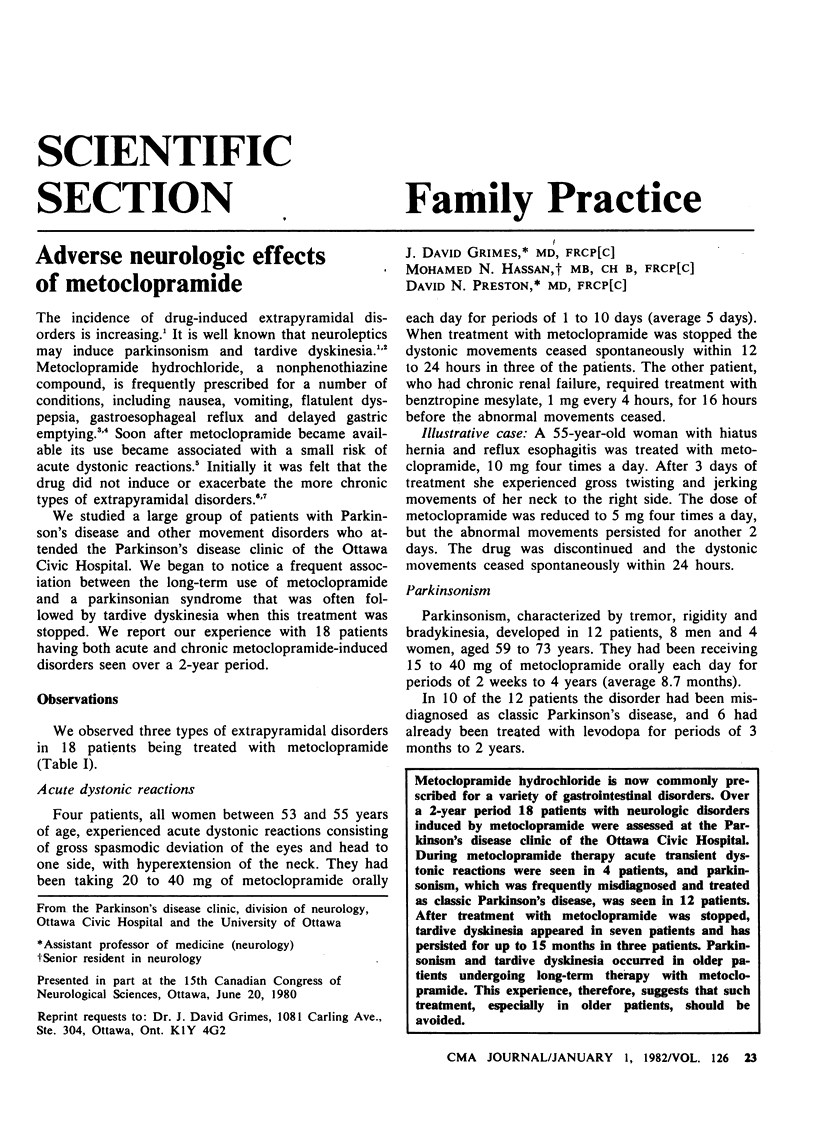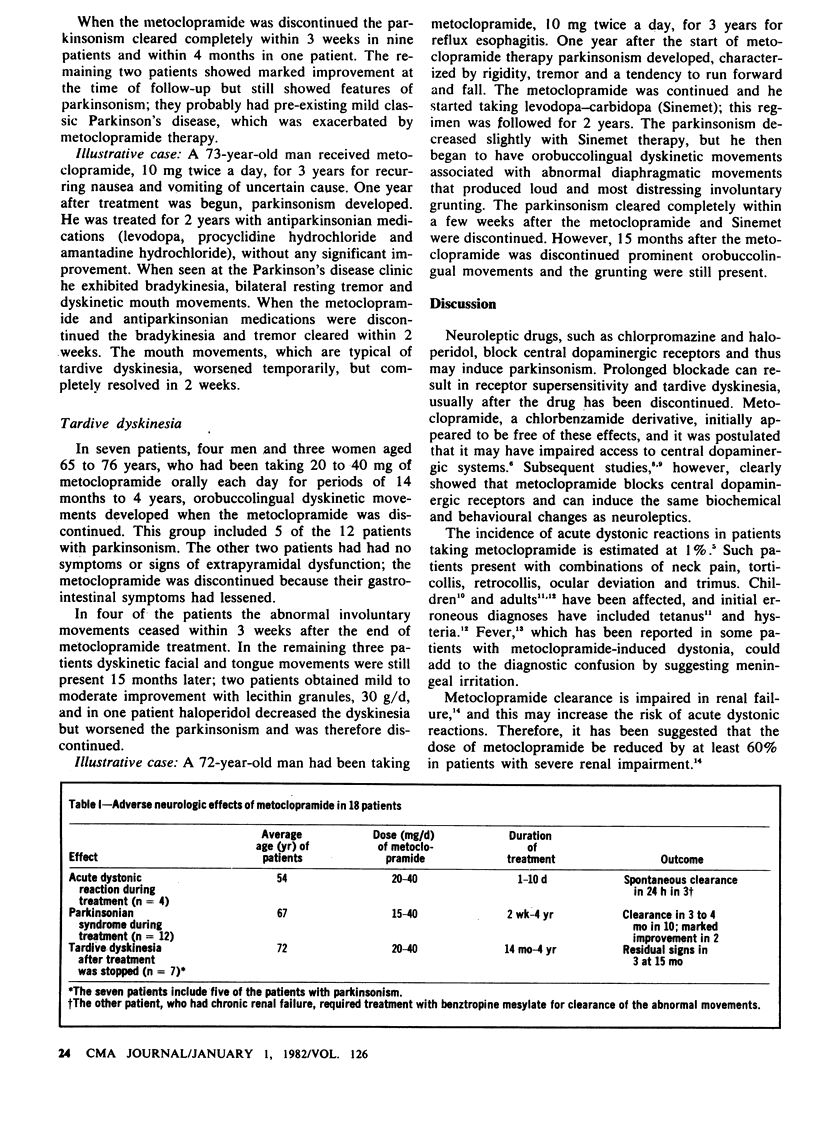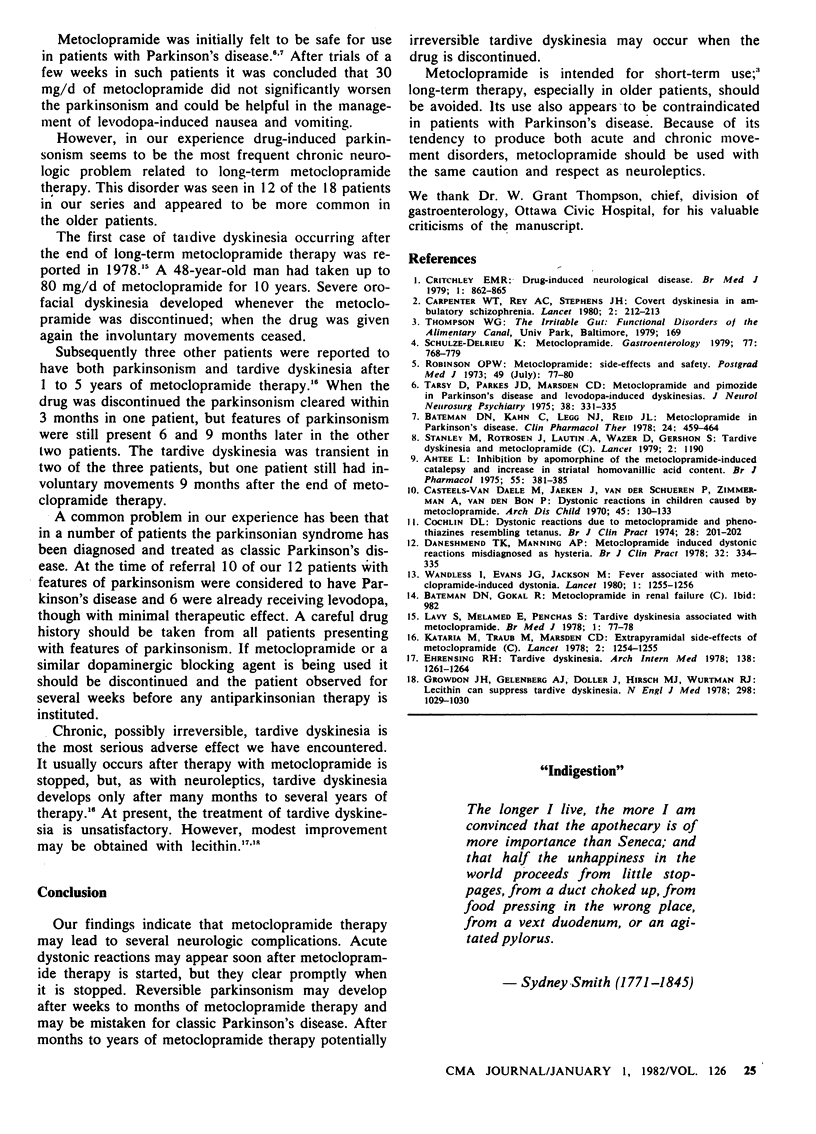Abstract
Metoclopramide hydrochloride is now commonly prescribed for a variety of gastrointestinal disorders. Over a 2-year period 18 patients with neurologic disorders induced by metoclopramide were assessed at the Parkinson's disease clinic of the Ottawa Civic Hospital. During metoclopramide therapy acute transient dystonic reactions were seen in 4 patients, and parkinsonism, which was frequently misdiagnosed and treated as classic Parkinson's disease, was seen in 12 patients. After treatment with metoclopramide was stopped, tardive dyskinesia appeared in seven patients and has persisted for up to 15 months in three patients. Parkinsonism and tardive dyskinesia occurred in older patients undergoing long-term therapy with metoclopramide. This experience, therefore, suggests that such treatment, especially in older patients, should be avoided.
Full text
PDF


Selected References
These references are in PubMed. This may not be the complete list of references from this article.
- Ahtee L. Inhibition by apomorphine of the metoclopramide-induced catalepsy and increase in striatal homovanillic acid content. Br J Pharmacol. 1975 Nov;55(3):381–385. doi: 10.1111/j.1476-5381.1975.tb06941.x. [DOI] [PMC free article] [PubMed] [Google Scholar]
- Bateman D. N., Kahn C., Legg N. J., Reid J. L. Metoclopramide in Parkinson's disease. Clin Pharmacol Ther. 1978 Oct;24(4):459–464. doi: 10.1002/cpt1978244459. [DOI] [PubMed] [Google Scholar]
- Carpenter W. T., Rey A. G., Stephens J. H. Covert dyskinesia in ambulatory schizophrenia. Lancet. 1980 Jul 26;2(8187):212–213. doi: 10.1016/s0140-6736(80)90107-5. [DOI] [PubMed] [Google Scholar]
- Casteels-Van Daele M., Jaeken J., Van der Schueren P., Van den Bon P. Dystonic reactions in children caused by metoclopramide. Arch Dis Child. 1970 Feb;45(239):130–133. doi: 10.1136/adc.45.239.130. [DOI] [PMC free article] [PubMed] [Google Scholar]
- Cochlin D. L. Dystonic reactions due to metoclopramide and phenothiazines resembling tetanus. Br J Clin Pract. 1974 Jun;28(6):201–202. [PubMed] [Google Scholar]
- Critchley E. M. Drug-induced neurological disease. Br Med J. 1979 Mar 31;1(6167):862–865. doi: 10.1136/bmj.1.6167.862. [DOI] [PMC free article] [PubMed] [Google Scholar]
- Daneshmend T. K., Manning A. P. Metoclopramide induced dystonic reactions misdiagnosed as hysteria. Br J Clin Pract. 1978 Nov;32(11):334–336. [PubMed] [Google Scholar]
- Ehrensing R. H. Tardive dyskinesia. Arch Intern Med. 1978 Aug;138(8):1261–1264. [PubMed] [Google Scholar]
- Growdon J. H., Gelenberg A. J., Doller J., Hirsch M. J., Wurtman R. J. Lecithin can suppress tardive dyskinesia. N Engl J Med. 1978 May 4;298(18):1029–1030. [PubMed] [Google Scholar]
- Kataria M., Traub M., Marsden C. D. Extrapyramidal side-effects of metoclopramide. Lancet. 1978 Dec 9;2(8102):1254–1255. doi: 10.1016/s0140-6736(78)92126-8. [DOI] [PubMed] [Google Scholar]
- Schulze-Delrieu K. Metoclopramide. Gastroenterology. 1979 Oct;77(4 Pt 1):768–779. [PubMed] [Google Scholar]
- Stanley M., Rotrosen J., Lautin A., Wazer D., Gershon S. Tardive dyskinesia and metoclopramide. Lancet. 1979 Dec 1;2(8153):1190–1190. doi: 10.1016/s0140-6736(79)92417-6. [DOI] [PubMed] [Google Scholar]
- Tarsy D., Parkes J. D., Marsden C. D. Metoclopramide and pimozide in Parkinson's disease and levodopa-induced dyskinesias. J Neurol Neurosurg Psychiatry. 1975 Apr;38(4):331–335. doi: 10.1136/jnnp.38.4.331. [DOI] [PMC free article] [PubMed] [Google Scholar]
- Wandless I., Evans J. G., Jackson M. Fever associated with metoclopramide-induced dystonia. Lancet. 1980 Jun 7;1(8180):1255–1256. doi: 10.1016/s0140-6736(80)91721-3. [DOI] [PubMed] [Google Scholar]


